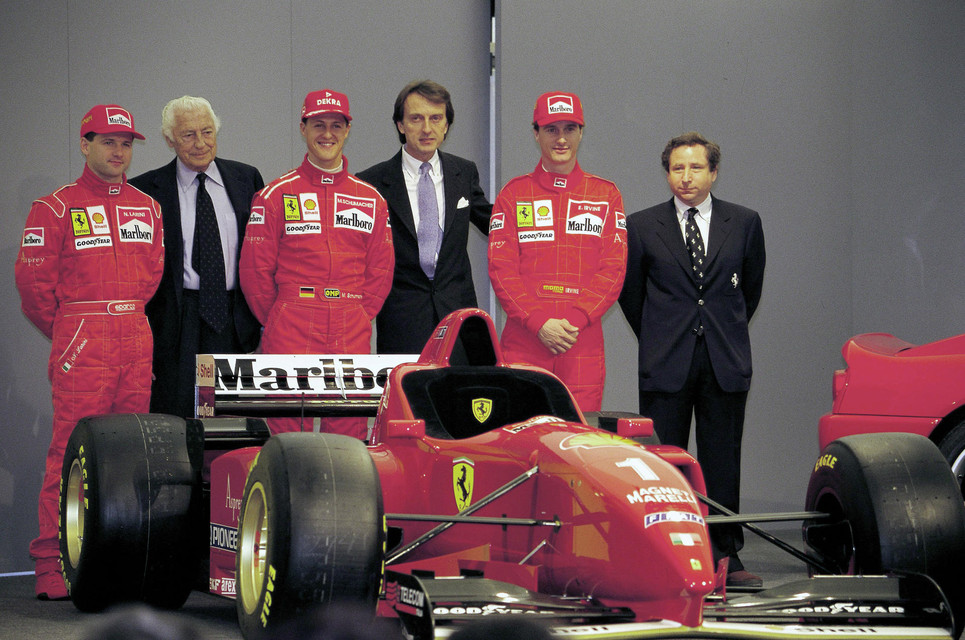When Michael Schumacher arrived at Ferrari in 1996, it was the start of one of the greatest turnaround stories in Formula 1 history.
When he arrived, Ferrari was unable to match the likes of Williams and McLaren. The Scuderia was an unstoppable force by the early 2000s, heaping five consecutive championships from 2000 through 2004. However, this was not an overnight sensation–it came about due to Schumacher’s work ethic, if he is king, he had better knights in the form of Jean Todt and Ross Brawn.
Making Ferrari a Championship Team
Ferrari hadn’t won a driver’s championship since 1979 before Schumacher. The squad suffered from reliability problems, strategic errors and a failure to gel. Schumacher had a different mindset—one built on finesse, discipline, and a never-say-die attitude.
The Winning Mentality
Schumacher expected perfection from the instant he arrived at Ferrari. With his work ethic, there was no one better — endless time in the simulator, pushing the engineers, always looking for something, expecting that from every member of the team.” He made the mechanics, strategists, and designers believe Ferrari could dominate again.
Building the Dream Team
Schumacher didn’t do it by himself. He helped bring together a legendary trio:
Jean Todt (Team Principal) – The man who allowed Schumacher to build the squad to his template.
Ross Brawn (Technical Director) – The man who masterminded strategies for race wins.
Rory Byrne (Chief Designer) – The design mastermind behind the Ferrari’s dominating machines.
This core team had already worked together at Benetton, where Schumacher won his first two titles. With them now at Ferrari, a winning machine was in place.
These were the innovations that ensured Ferrari’s dominance
Schumacher was more than a driver, he took an active role in the technical side of the sport. His input was crucial for Ferrari to produce cars that were not just very quick but also extremely reliable. Here are some of the breakthroughs he inspired:
Advanced Race Strategy
Alongside Ross Brawn, Schumacher honed aggressive pit stop strategies, including the iconic three-stop strategy at the 2004 French Grand Prix. While most teams made two stops, Schumacher’s capacity to extract every ounce of performance from the car’s tires meant Ferrari could afford to depart from the norm and design strategies that outfoxed their foes.
Fitness Revolution
Schumacher revolutionized driver fitness. Many drivers focused only on raw talent before him, but Schumacher’s intensive physical training ensured he was at peak performance for the duration of the race. This kind of preparation allowed him to thrive, especially under hot and strenuous conditions.
Car Development & Reliability
Early ’90s Ferrari cars had a reputation for being unreliable. Schumacher labored alongside engineers, trying new parts tirelessly. His talent for giving accurate feedback resulted in the F2002 and F2004, the market-leading Ferraris of all time.
Bridgestone Tire Partnership
Schumacher was an instrumental part of Ferrari’s exclusive Bridgestone relationship, ensuring tires built specifically to accommodate Ferrari’s cars and his driving style. This meant he had a huge advantage over Michelin-equipped competitors.
The Golden Era: Five Titles in a Row (2000-2004)
Schumacher’s patience and dedication paid off. After finishing close second in 1997 and 1998, Ferrari finally won its first drivers’ title in 2000—ending a 21-year run of not winning the championship title. Then came the era of total domination:
2001: Ferrari obliterated the opposition while using the F2001.
2002: Schumacher wrapped up the title by July, an all-time record.
2003: Another difficult season, but Schumacher fought back to claim his sixth championship.
2004: Ferrari at its peak—Schumacher won 13 of 18 races.
These wins made Schumacher the most successful driver in F1 history at the moment.
Schumacher’s Impact at Ferrari
Schumacher’s legacy lived on even in retirement, as he continued to define Ferrari. His efforts laid the groundwork for Ferrari’s subsequent success and his impact endures in how today’s F1 teams work.
His leadership, his discipline and his innovation didn’t just bring Ferrari race wins — it redefined what it meant to be a championship-winning team.
Would Ferrari have scaled such heights were it not for Schumacher? Maybe.
But would they have risen to become the dominant force of the early 2000s?
Not a chance.
Michael Schumacher didn’t just race for Ferrari—he built its empire.



